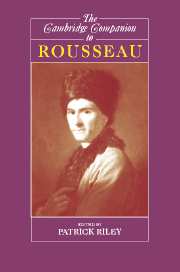Book contents
- Frontmatter
- 1 Introduction: Life and Works of Jean-Jacques Rousseau (1712-1778)
- 2 A General Overview
- 3 Rousseau, Voltaire, and the Revenge of Pascal
- 4 Rousseau, Fénelon, and the Quarrel between the Ancients and the Moderns
- 5 Rousseau's Political Philosophy: Stoic and Augustinian Origins
- 6 Rousseau's General Will
- 7 Rousseau's Images of Authority (Especially in La Nouvelle Heloise)
- 8 The Religious Thought
- 9 Émile: Learning to Be Men, Women, and Citizens
- 10 Émile: Nature and the Education of Sophie
- 11 Rousseau's Confessions
- 12 Music, Politics, Theater, and Representation in Rousseau
- 13 The Motto Vitam impendere vero and the Question of Lying
- 14 Rousseau's The Levite of Ephraim: Synthesis within A “Minor” Work
- 15 Ancient Postmodernism in the Philosophy of Rousseau
- Bibliography
- Index
3 - Rousseau, Voltaire, and the Revenge of Pascal
Published online by Cambridge University Press: 28 May 2006
- Frontmatter
- 1 Introduction: Life and Works of Jean-Jacques Rousseau (1712-1778)
- 2 A General Overview
- 3 Rousseau, Voltaire, and the Revenge of Pascal
- 4 Rousseau, Fénelon, and the Quarrel between the Ancients and the Moderns
- 5 Rousseau's Political Philosophy: Stoic and Augustinian Origins
- 6 Rousseau's General Will
- 7 Rousseau's Images of Authority (Especially in La Nouvelle Heloise)
- 8 The Religious Thought
- 9 Émile: Learning to Be Men, Women, and Citizens
- 10 Émile: Nature and the Education of Sophie
- 11 Rousseau's Confessions
- 12 Music, Politics, Theater, and Representation in Rousseau
- 13 The Motto Vitam impendere vero and the Question of Lying
- 14 Rousseau's The Levite of Ephraim: Synthesis within A “Minor” Work
- 15 Ancient Postmodernism in the Philosophy of Rousseau
- Bibliography
- Index
Summary
THE OL D MISANTHROPE AND THE NEW
At the end of his Lettres philosophiques (1734), Voltaire attempted to refute Pascal, the thinker all the philosophes regarded as their archnemesis. It was profoundly disturbing to Voltaire, the author two years later of the world-affirming poem “Le mondain,” that Pascal did not start with the philosophy of Port Royal and then work outward, as expected, to his condemnation of the social world. For such a conventional Christian maneuver the philosophes were, of course, well prepared. Rather, Pascal did something far more threatening: He spoke as a worldling and a skeptic who had eventually retreated to the shelter of Port Royal. Pascal, who might have been a forerunner of the philosophes, chose instead to reject in advance the dreams of Voltaire, Diderot, and company.
All through the eighteenth century Pascal continued to haunt the French Enlightenment. Holbach, as late as the 1770s, still found it necessary to quarrel with the author of the Pensées-, Condorcet, when editing Pascal's works, renewed the old debate; Voltaire throughout his life, and even in his last year, launched sally after sally at the writer who frightened him every time he - a hypochondriac - felt ill.
- Type
- Chapter
- Information
- The Cambridge Companion to Rousseau , pp. 57 - 77Publisher: Cambridge University PressPrint publication year: 2001
- 13
- Cited by

